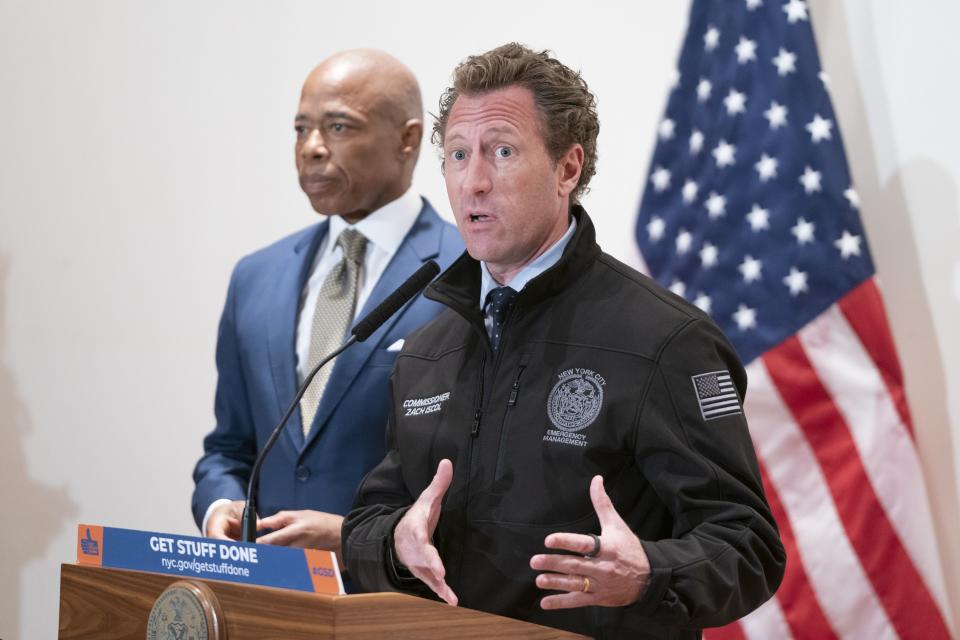NYC’s emergency management head slams City Council bill on improving migrant shelter conditions
- Oops!Something went wrong.Please try again later.
- Oops!Something went wrong.Please try again later.
New York City’s emergency management chief came out guns blazing Wednesday against a City Council bill focused on improving conditions in migrant shelters, blasting the measure as “performative” and even “dangerous.”
Zach Iscol, the Emergency Management agency commissioner, delivered the broadside during a contentious Council hearing on the bill, which would require that the city’s emergency housing sites for asylum seekers comply with right-to-shelter rules.
“I think it’s performative at best. I think it’s dangerous at worst,” Iscol said, underscoring that Mayor Adams would not sign the legislation should it pass the Council.
The city’s longstanding right-to-shelter mandate requires mayoral administrations to make sure shelter residents have access to certain basic amenities, like laundry, showers and lockers. It also requires that beds be placed at least 3 feet apart in congregate shelter settings.
As the city shelter system remains at capacity due to the ongoing migrant crisis, Adams’ administration has argued it shouldn’t be constrained by right-to-shelter requirements as it opens new emergency housing sites for asylum seekers in unconventional settings like airport warehouses and public school gyms. Lawyers for Adams took the extraordinary step last month of asking a judge to give the administration permission to suspend right-to-shelter altogether.
After getting into a shouting match with Brooklyn Councilwoman Shahana Hanif, a Democrat who wrote the bill, Iscol said at Wednesday’s hearing that he believes requiring emergency migrant sites abide by right-to-shelter would backfire.
If laundromats, showers, lockers and other amenities were mandated at every site, he said the administration wouldn’t be able to open enough shelters and migrants could end up sleeping on the streets.
“I wish we could wave some sort of magic wand to generate 3 feet of space between cots, to make sure that we have, you know, 15 showers and toilets for every individual, but that’s not the nature of emergencies,” he said. “We have to operate in the real world, and this threatens to remove the flexibility we need to respond.”
In a statement after the hearing, Hanif, who co-chairs the Council’s Progressive Caucus, countered that it’s Iscol’s defense of the administration’s “shadow shelter system” that’s “dangerous.”
She was referring to the so-called “respite centers” Adams’ administration has opened across the city. Adams’ team has said the sites — many of which lack showers in apparent violation of right-to-shelter rules, as reported by the Daily News — are meant to only house migrants for short periods until the administration can find better options for them in traditional shelters or emergency hotels.
“But we know people have been there for over a month,” Hanif said of the facilities. “The administration called our bill to set standards for these centers ‘performative,’ but this bill is essential to protecting dignified housing.
“I found today’s testimony especially concerning with the backdrop of the mayor’s recent actions. In addition to challenging the court-mandated right-to-shelter law, the mayor is threatening to veto legislation to make it easier to transition out of shelters and into housing,” she added, referencing a feud between the mayor and the Council about legislation related to the CityFHEPS rental voucher system.
The city currently operates 11 respite centers, housing about 3,000 migrants on any given day, Iscol testified. He acknowledged that at least three of those sites do not have “ideal shower solutions.”
Asked about the fact that migrants end up staying at respite centers for extended periods, Iscol indicated that the administration doesn’t see the sites as meant solely for short stays anymore.
“There is no maximum amount of time,” Iscol said of how long migrants can stay at the locations. “It’s when space becomes available [elsewhere].”
A second Council bill discussed at Wednesday’s hearing, also introduced by Hanif, would require that the city inform migrants they can enter a traditional Department of Homeless Services shelter instead of an emergency respite site.
Iscol said the administration opposes that bill, too. “This bill is also at odds with the reality of where we are,” he said.
At an unrelated press conference in Manhattan earlier in the day, Adams was asked about mounting criticism over his push to roll back the right-to-shelter mandate, which has been in effect since the early 1980s.
The mayor said such criticism isn’t “rooted in reality” and used what’s become a go-to rhetorical flourish when it comes to the migrant crisis — questioning whether detractors have visited Washington, D.C., to request more federal help as the city continues to shelter and provide services for nearly 50,000 asylum seekers.
“My beginning point is to ask, ‘Have you been to Washington?’” he said. “This problem is a Washington problem that has been dropped in the lap of New York City residents. It is unfair to New York City residents.”


